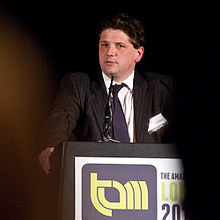 David Allen Green, legal correspondent for the New Statesman out of the UK, has spent the last few days calling attention to a leaked confidentiality or non-disclosure agreement (NDA), which he revealed in a blog post on May 11. Green has posted a second post on the agreement on his blog, Jack of Kent, and will be posting a summary to the New Statesman website on May 16, which last time I checked, he intends to glibly title, "NDAs for Dummies."
David Allen Green, legal correspondent for the New Statesman out of the UK, has spent the last few days calling attention to a leaked confidentiality or non-disclosure agreement (NDA), which he revealed in a blog post on May 11. Green has posted a second post on the agreement on his blog, Jack of Kent, and will be posting a summary to the New Statesman website on May 16, which last time I checked, he intends to glibly title, "NDAs for Dummies."
I published an initial analysis of the leaked agreement on WL Central. The analysis was featured as a “Best Opinion” in an “Irony Alert” blog post on the agreement on The Week’s website.
Green, who is the blogger who was the first to draw attention to the agreement, called it a “draconian and extraordinary legal gag that WikiLeaks imposes on its own staff” and, in particular, focused on Clause 5 of the agreement that “imposes a penalty of ‘£12,000,000 – twelve million pounds sterling’ on anyone who breaches this legal gag.”
In his follow-up post, which cites the analysis I wrote, he groups me with others who “sought to explain the document away: to normalize it and to contend that it is somehow unexceptional.” That is true. That is what I did.
He adds:
It may be well that for WikiLeaks partisans (like "the Birthers" in the United States), nothing - not even a disclosed document- will shift their adherence to their cause.
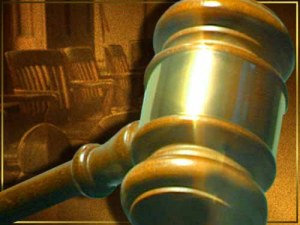 Edited podcast now posted.
Edited podcast now posted.
There are three high profile federal grand jury investigations. For each one, the argument could be made that the grand jury is chilling political action or seeking to criminalize people for associating with certain groups that are not charged with committing any crimes but instead are unsavory and illegitimate to the government.
The investigations being referred to are the investigation into Anonymous that is based in San Jose, California, the investigation into antiwar and international solidarity activists that is based in Chicago, Illinois, and the investigation into WikiLeaks that is based in Alexandria, Virginia.
Joining the "This Week in WikiLeaks" show this week is Jim Fennerty, who is a Chicago-based attorney defending the activists who were raided by the FBI in September of last year and now face a grand jury investigation. He is with the National Lawyers Guild and will be here to talk about his work defending the activists and will talk about the grand jury process and what those following the WikiLeaks might see happen in Alexandria as the investigation moves forward.
To listen to the show, click play on the widget below:
You can also listen to the show by going to this page. The podcast will appear in the list of "CMN News" episodes. Click the latest "This Week in WikiLeaks" episode and download. (The podcast can also be downloaded off of iTunes by searching for "CMN News" and then downloading the latest podcast.)
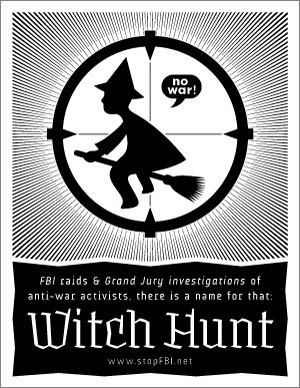
In the final week of January, twelve anti-war, labor and international solidarity activists were expected to appear before a grand jury in Chicago. They refused to go before the grand jury.
These activists from Chicago, the Twin Cities in Minnesota, and other areas have been subpoenaed over the past months. Several of the activists had their homes raided. Documents, cell phones, storage disks, computers, and children's artwork were seized from their home. The subpoenas indicated the FBI was looking for evidence that the activists had provided "material support for terrorism." And, it was discovered that the FBI had an informant, who went by the name of "Karen Sullivan," infiltrate an anti-war group in the Twin Cities.
This "witch-hunt" began on September 24th and, since then, U.S. Attorney Patrick Fitzgerald has been working to get activists to testify before a grand jury in Chicago. So far, all the activists have refused to participate in this "fishing expedition."
WL Central recently began posting coverage of this story. And, as the grand jury investigation into WikiLeaks and those who might be linked to WikiLeaks advances, it seems appropriate to provide context and shine a light on other stories of suppression of freedom and civil liberties in the United States.
Here is a profile of one of the activists (which I wrote and originally posted at OpEdNews.com in January):
GOP Leads Hearing on 'Improving' Whistleblower Provisions in Dodd-Frank Financial Reform Bill
 A hearing titled, “Legislative Proposals to Address the Negative Consequences of the Dodd-Frank Whistleblower Provisions,” was held today. Focused on proposed legislation from Rep. Michael Grimm (R-NY), the hearing looked at how to “improve” the Dodd-Frank Act by “preserving” the internal reporting mechanisms or processes that companies have setup for whistleblowers (e.g. hotlines).
A hearing titled, “Legislative Proposals to Address the Negative Consequences of the Dodd-Frank Whistleblower Provisions,” was held today. Focused on proposed legislation from Rep. Michael Grimm (R-NY), the hearing looked at how to “improve” the Dodd-Frank Act by “preserving” the internal reporting mechanisms or processes that companies have setup for whistleblowers (e.g. hotlines).
Rep. Grimm essentially argued that the changes in Dodd-Frank make it highly likely the “floodgate” will open. Frivolous claims and costly penalties will arise from the fact that whistleblowers are now allowed to go to the SEC before reporting fraud or corruption through a company’s internal reporting system.
Marcia Narine, a witness appearing before the committee on behalf of the US Chamber of Commerce, suggested Dodd-Frank provisions aim to treat all companies like criminals and assume if employees bring a tip documents will begin to be shredded to cover up corruption or fraud. She found this to be unfair and argued that companies are being penalized for not doing their job, for not paying attention to a whistleblower that had information on Bernie Madoff and was ignored.
Kenneth Daly of the National Association of Corporate Directors (NACD) asserted that the provisions in Dodd-Frank change the “emphasis from problem solving to getting paid for problem identification.” What developed later in the hearing was this conventional wisdom that whistleblowers could now be rewarded for malfeasance.

Update 2 - May 11 - 1:50 PM New York Time
This statement was posted by the Committee to Stop FBI Repression yesterday night. It is the latest on Hatem Abudayyeh, a Palestinian solidarity activist, who is one of twenty-three activists that has been subpoenaed to appear before a grand jury in Chicago.
From the statement:
On Friday, May 6th, the bank accounts of Hatem and Naima Abudayyeh of Chicago were frozen. The bank manager at the TCF (Twin Cities Federal) branch could not explain what had happened but stated that the Bank Security Act prevented him from releasing any assets.
In a strange turn of events, the bank admitted announced today (May 10) that they shut down the accounts, stating they no longer want to provide banking services to the Abudayyeh family. Simultaneously, TCF management informed the Abudayyehs today that they were issuing them a check for the value of their accounts.
Calls from across the United States ha an impact. A Code Pink activist from Washington, DC called US Attorney Patrick Fitzgerald's office and was told, "We've received hundreds of calls." The Office of Foreign Assets Control (OFAC) received numerous calls as well and "journalists from a National Public Radio affiliate, Al Jazeera and other agencies contacted them for an explanation."
The family's attorney, Michael Deutsch, says, "In my opinion, the bank did not act out of the blue. I suspect that the FBI and U.S Attorney investigation caused the bank to overreact and illegally freeze the Abudayyehs’ banking accounts that had been there for over a decade."
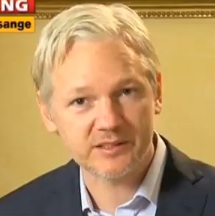 A federal grand jury is meeting at 11 am EST in Alexandria, Virginia. The grand jury is being employed to “build” a case against Julian Assange, the WikiLeaks founder who just won a gold medal for peace and justice from the Sydney Peace Foundation.
A federal grand jury is meeting at 11 am EST in Alexandria, Virginia. The grand jury is being employed to “build” a case against Julian Assange, the WikiLeaks founder who just won a gold medal for peace and justice from the Sydney Peace Foundation.
“The WikiLeaks case is part of a much broader campaign by the Obama administration to crack down on leakers,” writes Carrie Johnson of NPR. Johnson is one of a few reporters in the US press who has published a report today on this stirring development in the United States. She finds “national security experts” cannot “remember a time when the Justice Department has pursued so many criminal cases based on leaks of government secrets.”
The number of people subpoenaed to appear before the grand jury is unclear (and not in any of the few news articles published on the grand jury so far). What is known is that at least one individual from Cambridge was issued a subpoena seeking to compel him to testify before a Grand Jury. Glenn Greenwald of Salon.com reported the individual served had a public link to the WikiLeaks case and it was “highly likely” the subpoena was connected to the WikiLeaks Grand Jury investigation.
There are two other federal Grand Juries that are ongoing in the country. In San Jose, California, a Grand Jury has been empanelled to investigate the “hacktivist” group, Anonymous. Another Grand Jury in Chicago has been empanelled to target antiwar, labor and international solidarity activists for their political action.
 Julian Assange Says Whistleblowers “Heroes,” WikiLeaks Played “Significant Role” in Recent Arab Uprisings As He Accepts Sydney Peace Prize
Julian Assange Says Whistleblowers “Heroes,” WikiLeaks Played “Significant Role” in Recent Arab Uprisings As He Accepts Sydney Peace Prize
Julian Assange, founder of WikiLeaks, was awarded the Sydney Peace Model at the Frontline Club in London. The award was given to recognize his work for “greater transparency and accountability of governments.” @Asher_Wolf covered the event on Twitter.
Assange said, “WikiLeaks is the most scrutinized organization per capita in the world,” and that he was in “the absurd situation of receiving the Sydney Peace Prize in London whilst wearing a surveillance device” around his ankle. He noted that the submission site for WikiLeaks is being re-engineered as a result of “sabotage and website attacks.” Also, Assange acknowledged that coverage of releases from WikiLeaks could devolve into newspapers attacking each other.
Below is video of Assange accepting the medal:
Traditional media organizations, especially those in the United States, are afraid of WikiLeaks. It threatens their position in society.
The new "leaks portal" launched by the Wall Street Journal called "SafeHouse" is not just a shoddy excuse of a system for accepting leaks from "sources" but a sign that the WSJ is afraid of WikiLeaks and how the organization is transforming journalism.
In an up-and-coming documentary on the New York Times, "Page One: A Year Inside the New York Times," executive editor of the Times Bill Keller says on-camera, "The bottom line is, WikiLeaks doesn't need us. Daniel Ellsberg did.” That reality has likely fueled the tension between Julian Assange and WikiLeaks and Bill Keller and the Times.
At the 2011 National Conference for Media Reform (NCMR) in Boston about a month ago, Greg Mitchell, blogger for The Nation, who has been blogging all things WikiLeaks since the release of the US State Embassy cables began, was present for a panel on WikiLeaks. The panel, in addition to Mitchell, featured Amy Goodman, Glenn Greenwald, Micah Sifry, Emily Bell, and Christopher Warren. [The full panel can be viewed here.]
I had the privilege of interviewing Mitchell the day after the panel for The Nation.
[Full disclosure: I currently serve as an intern for The Nation and I happen to assist Mitchell on a daily basis.]
 Edited podcast now posted.
Edited podcast now posted.
This week's podcast features Michael K. Busch, who teaches international relations at the City College of New York, where he is also program coordinator at the Colin Powell Center for Policy Studies. He has been covering the Gitmo Files in detail. He has also covered released cables on his site WikiBlogged, and he is listed as a resource in the back of Greg Mitchell's published book, "Age of WikiLeaks," which you can purchase in print on Blurb.com or in e-book form off of Amazon. [Follow him on Twitter @michaelkbusch]
On the program, we discuss the killing of Osama bin Laden in the context of the Pakistan Cables that one media organization, The Hindu (in India), covered extensively. We also talk about the files Busch has covered extensively and what his thoughts are on the release in general. And, the show discusses the Journal's newly launched SafeHouse, a WikiLeaks-imitation website it hopes "sources" will "leak" to like "sources" have leaked to WikiLeaks. [For more on this, WL Central coverage can be found here.]
This article was originally posted on Foreign Policy in Focus.
By Michael Busch
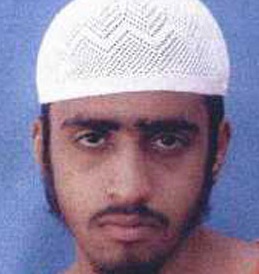 The story of Yasser Talal Al Zahrani offers one of the most mysterious, and ultimately tragic, narratives in the “Gitmo Files” published by WikiLeaks this past week. The son of “a senior official in the Saudi Interior Ministry, reportedly holding the rank of abid, or brigadier,” the seventeen-year-old al Zahrani reportedly left home, having just completed the eleventh grade, “after hearing that sheiks from neighboring [sic throughout] towns were saying jihad in Afghanistan (AF) was a religious duty.”
The story of Yasser Talal Al Zahrani offers one of the most mysterious, and ultimately tragic, narratives in the “Gitmo Files” published by WikiLeaks this past week. The son of “a senior official in the Saudi Interior Ministry, reportedly holding the rank of abid, or brigadier,” the seventeen-year-old al Zahrani reportedly left home, having just completed the eleventh grade, “after hearing that sheiks from neighboring [sic throughout] towns were saying jihad in Afghanistan (AF) was a religious duty.”
He first travelled to Karachi, Pakistan, financing “the trip himself with saving he had earned selling perfumes to hajj pilgrims.” In Karachi, al Zahrani hooked up with a man named Saria al Makki, who travelled with him to Konduz, Afghanistan.
In Konduz, detainee was taken to a place called the Taliban Center. He spent one month training under an individual named Khair Allah on the use of the Kalishnikov rifle, the Makarov pistol, hand grenades, and in field training. The detainee was then assigned a guard position at a second line post between Konduz and Taloqan.
The American Taliban fighter, John Walker Lindh, remembered Abu Ammar distinctly, in part because he was little more than a kid when they fought together in Afghanistan.
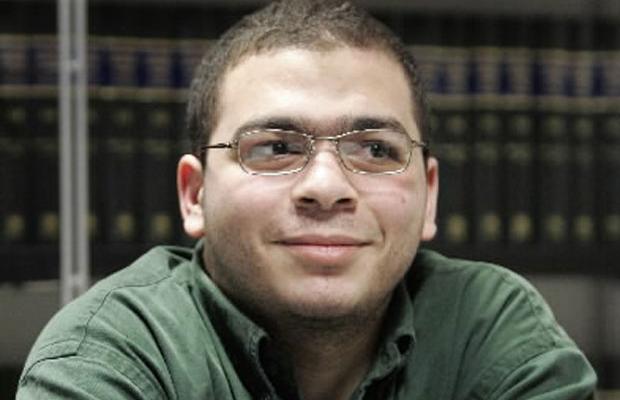 In December 2005, Abdullah Khadr, older brother of Omar, Abdurahman and Abdul Karim Khadr and younger brother of Zaynab, returned to his home in Toronto, Canada after fourteen months of being held in a Pakistan prison without charges. One week later he was arrested in Canada and held without bail, pending extradition to the US. The US had earlier obtained information from the Taliban which suggested to them Abdullah may have been the suicide bomber who killed a Canadian soldier in Kabul in January 2004. In an interview with CBC News on Feb. 25, 2004, Abdullah Khadr said, "If I was the suicide bomber, I wouldn't be doing this interview with you right now."
In December 2005, Abdullah Khadr, older brother of Omar, Abdurahman and Abdul Karim Khadr and younger brother of Zaynab, returned to his home in Toronto, Canada after fourteen months of being held in a Pakistan prison without charges. One week later he was arrested in Canada and held without bail, pending extradition to the US. The US had earlier obtained information from the Taliban which suggested to them Abdullah may have been the suicide bomber who killed a Canadian soldier in Kabul in January 2004. In an interview with CBC News on Feb. 25, 2004, Abdullah Khadr said, "If I was the suicide bomber, I wouldn't be doing this interview with you right now."
This time he was indicted in the US on charges of supplying weapons to Al Qaeda in Pakistan. In August 2006, Khadr's lawyer Dennis Edney filed an application to stay the extradition proceedings, arguing that the US government's evidence against Khadr was inadmissible because it relied on information gathered under torture in Pakistan. Khadr was held in a detention centre for the next five years until his release last August when the stay was granted and the presiding judge called his treatment "both shocking and unjustifiable."
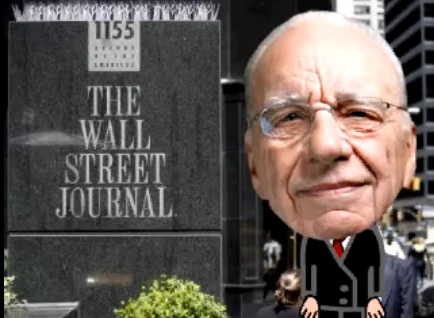 Several reports on the web security and privacy of the Wall Street Journal’s new site, SafeHouse, which is inspired by WikiLeaks, have been published. Reactions centered around the “terms and conditions” on the website, which include a disclaimer that SafeHouse “cannot ensure complete anonymity." It also states the leak portal “reserve[s] the right to disclose any information about you to law enforcement authorities or to a requesting third party, without notice, in order to comply with any applicable laws and/or requests under legal process.”
Several reports on the web security and privacy of the Wall Street Journal’s new site, SafeHouse, which is inspired by WikiLeaks, have been published. Reactions centered around the “terms and conditions” on the website, which include a disclaimer that SafeHouse “cannot ensure complete anonymity." It also states the leak portal “reserve[s] the right to disclose any information about you to law enforcement authorities or to a requesting third party, without notice, in order to comply with any applicable laws and/or requests under legal process.”
Web security and privacy experts will continue to scrutinize this new venture. Those like Jacob Appelbaum, a security researcher and senior developer on the Tor online anonymity network will continue to let others know the Journal is being negligent and that this is not a project to be beta-tested on an open Internet. In addition to the security questions, there is the larger question of the Journal’s role in the press and why anyone would ever consider leaking to a newspaper like the Journal.
For establishing a basic understanding of this news organization, this is how SourceWatch, run by the Center for Media and Democracy, characterizes the publication: “The Wall Street Journal, an influential international daily newspaper published in New York City, is owned by News Corporation, which is owned by Rupert Murdoch. It does an abysmal job of informing its readers about climate change.”
 The recent Canadian election has been the topic of much foreign news coverage, with pundits trying to explain why liberal-minded Canada has given a majority to the most right leaning party in its history, what exactly the New Democratic Party is, and why on earth Canada turned its back so firmly on its 'traditional ruling party', headed by a man described in the Guardian as "known to the British as a fine writer, historian and BBC talking head, who had returned to Canada to lead the Liberals". Embassy Magazine wrote an astoundingly condescending piece about Canada's lack of interest in foreign policy which contained the following:
The recent Canadian election has been the topic of much foreign news coverage, with pundits trying to explain why liberal-minded Canada has given a majority to the most right leaning party in its history, what exactly the New Democratic Party is, and why on earth Canada turned its back so firmly on its 'traditional ruling party', headed by a man described in the Guardian as "known to the British as a fine writer, historian and BBC talking head, who had returned to Canada to lead the Liberals". Embassy Magazine wrote an astoundingly condescending piece about Canada's lack of interest in foreign policy which contained the following:
Given Liberal leader Michael Ignatieff's background, many had expected him to campaign on foreign policy. And at the start of the campaign he did try to frame the election around the question of ethics, especially the tenor of Conservative foreign policy. ... But ... Mr. Ignatieff failed to inspire with this foreign policy-tinged message. In fact, the more he talked about it, the less traction he seemed to be getting with centrist or progressive voters. ... At one point, the Liberal leader's frustration became quite evident, with Mr. Ignatieff wondering why Canadians were not latching onto the many controversies that had dogged the Conservatives before the election. Mr. Ignatieff's plea that Canada should regain its international standing was a version of this idea that the country should be undergoing some soul-searching prior to voting. But with his historic low, it appears Canadians weren't up for that sort of deep think.
Celebration Photos Just as Likely to Inflame ‘Terrorists’ as Bin Laden Death Photos
The decision to not release photos of a dead and fatally wounded Osama bin Laden rests on at tenuous set of reasons that rest purely on Beltway conventional wisdom.
The argument that the release of photos could inflame the Middle East has been made before (recall the Obama Administration blocked the release of “torture photos” in May 2009 that the ACLU was seeking to obtain through a Freedom of Information Act request). Greg Mitchell with The Nation reminds Americans of the debate that surrounded the decision to release photos of Abu Musab al-Zarqawi after his death.
Jon Stewart made a good point last night on “The Daily Show":
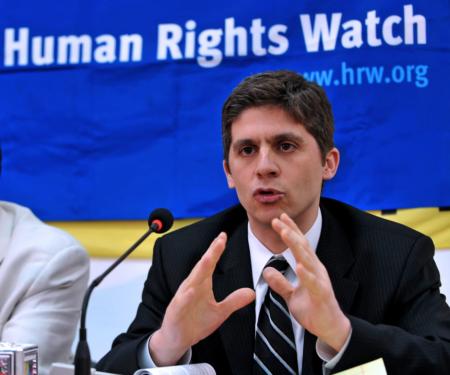 On May 4, Mr. Colangelo, a Senior attorney at US-based Dorsey and Whitney LLP, and a consultant with Human Rights Watch was bared entry into Bahrain. Authorities cited his need for a visa, because of the "kind of work" he does, although Colangelo has frequently travelled to the country on various business matters with no prior incident.
On May 4, Mr. Colangelo, a Senior attorney at US-based Dorsey and Whitney LLP, and a consultant with Human Rights Watch was bared entry into Bahrain. Authorities cited his need for a visa, because of the "kind of work" he does, although Colangelo has frequently travelled to the country on various business matters with no prior incident.
In February, Mr. Colangelo spoke at a press conference at Bahrain Human Rights Society (BHRS) in Manama. Mr. Colangelo has also represented Bahraini who were Guantanamo detainees.
HRW has released an 89-page report stating that Bahrain needs to take "urgent steps to end torture and ill-treatment of security suspects during interrogation. The report also called on the government to promptly investigate all torture allegations and prosecute security officials suspected of abusing detainees" (Source; Saudi News Today).
Bahrain's ongoing crackdown has escalated since February, targeting every level of society with fewer and fewer outside observers allowed into the country. See WL Central's ongoing coverage of Bahrain: May, April, March 1 through 21, March 22 through 31, and February.
I spoke last night EST with Mr. Colangelo, while he was on a stop over in Paris, en route back to the Unites States from Bahrain.
TRANSCRIPT
Why were you going to Bahrain?
I have been involved with issues concerning Bahrain for a number of years. It began with representing the Bahraini who were detained at Guantanamo, and more recently I have worked as a consultant with Human Rights Watch on domestic Bahrain issues.
Amnesty International is today requesting more information from US and Pakistani authorities regarding the killing of Osama Bin Laden and four others by US forces. “We are seeking information from the US and Pakistani authorities about how many people were in the compound at the time of the operation, what happened to them and specifically what is the status and current whereabouts of the survivors,” said Claudio Cordone, Senior Director at Amnesty International. The survivors are said to include at least six children. Of the eighteen people reportedly at the compound, five were reported killed and two injured.
The US authorities maintain that they had full authority to kill Bin Laden, and that he was unarmed but had "resisted capture". “Given that he was not armed, it is not clear how he resisted arrest and whether an attempt was made to capture him rather than kill him,” said Claudio Cordone. “Amnesty International believes that US forces should have attempted to capture Osama bin Laden alive in order to bring him to trial if he was unarmed and posing no immediate threat.”
Amnesty has stated, Osama bin Laden claimed responsibility for acts of terrorism amounting to crimes against humanity and has inspired others to commit similar acts. Perpetrators of such acts must be brought to justice in a manner consistent with international law.
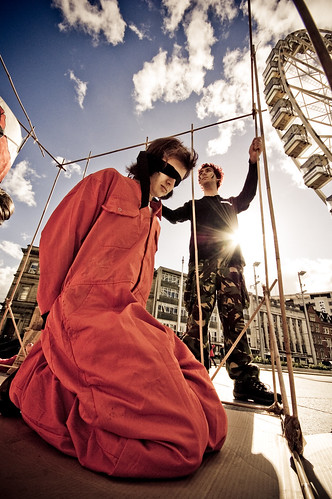
Hundreds of detainees at Guantanamo Bay are known to have engaged in hunger strikes at the prison in protest of conditions and their prolonged confinement without trial. A recent report from Jason Leopold of Truthout.org details how, as of March, detainees continue to participate in hunger strikes with the hope that the conditions of their detention will improve or so they will no longer have their basic due process rights violated.
Detainees first began to engage in hunger strikes in 2002. The hunger strikes had a definite impact. The strikes from 2002 to 2005 effectively changed the dynamics in the prison. Former detainee Binyam Mohamed said there was no law and a colonel was saying, “’I do what I like’ but after the hunger strike – the big hunger strike of 2005 – they actually started implementing some kind of law that we knew about.” But, come 2006, the prison began to force feed detainees that were striking and would force tubes down detainees’ throats in a manner that successfully convinced many of the detainees to end their resistance.
Around 6pm on Saturday, a week before finals, the annual Wheeler Block Party at Western Illinois University, turned into a "G-20 style" crackdown by a multi-jurisdictional force from the Illinois police agency with the department of Homeland Security, Macomb police officers, McDonough County sheriff department, and state police.
Riot police used mace, dogs, tear gas, and LRAD sound canons.
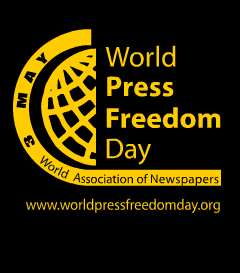 Today, the United States hosts World Press Freedom Day. The day, which was proclaimed to be May 3 by the UN General Assembly in 1993, is supposed to be an occasion for informing citizens of violations of press freedom. The day is to serve as a reminder “in dozens of countries around the world, publications are censored, fined, suspended and closed down, while journalists, editors and publishers are harassed, attacked, detained and even murdered.”
Today, the United States hosts World Press Freedom Day. The day, which was proclaimed to be May 3 by the UN General Assembly in 1993, is supposed to be an occasion for informing citizens of violations of press freedom. The day is to serve as a reminder “in dozens of countries around the world, publications are censored, fined, suspended and closed down, while journalists, editors and publishers are harassed, attacked, detained and even murdered.”
When it was announced in December 2010 the US would be hosting World Press Freedom Day, WikiLeaks had just partnered with a few media organizations to release the US State Embassy Cables. The release known as “Cablegate” led to calls from elected politicians to prosecute members of the WikiLeaks media organization. While no specific newspapers were condemned or targeted (only the New York Times was publishing cables), the calls for prosecution were in effect attacks on press freedom from those in power.
The prosecution of WikiLeaks escalated last week as federal prosecutors stepped up its investigation into WikiLeaks by delivering a letter and a subpoena to an individual in Boston, someone whom a Grand Jury in Alexandria, Virginia, would like to press for details on WikiLeaks. The letter makes it clear the Grand Jury is interested in prosecuting WikiLeaks under the Espionage Act and would like to find out if individuals working for or with WikiLeaks conspired with the leaker of the information to get information.
Amnesty International has released a statement on the assassination of Osama Bin Laden. They have announced they will be looking into the killing of Bin Laden and others in Pakistan.
Osama Bin Laden, the leader of al-Qaida, has been killed by US forces during an operation in Pakistan, US President Barack Obama has said.
"Osama Bin Laden took credit for and supported acts around the world which amounted to crimes aganist humanity. He also inspired others to commit grave human rights abuses," said Claudio Cordone, Senior Director at Amnesty International.
"His death will put an end to his role in organizing or inspiring such criminal acts. We do not know the full circumstances of his killing and the others with him and we are looking into that."
Theme by Danetsoft and Danang Probo Sayekti inspired by Maksimer